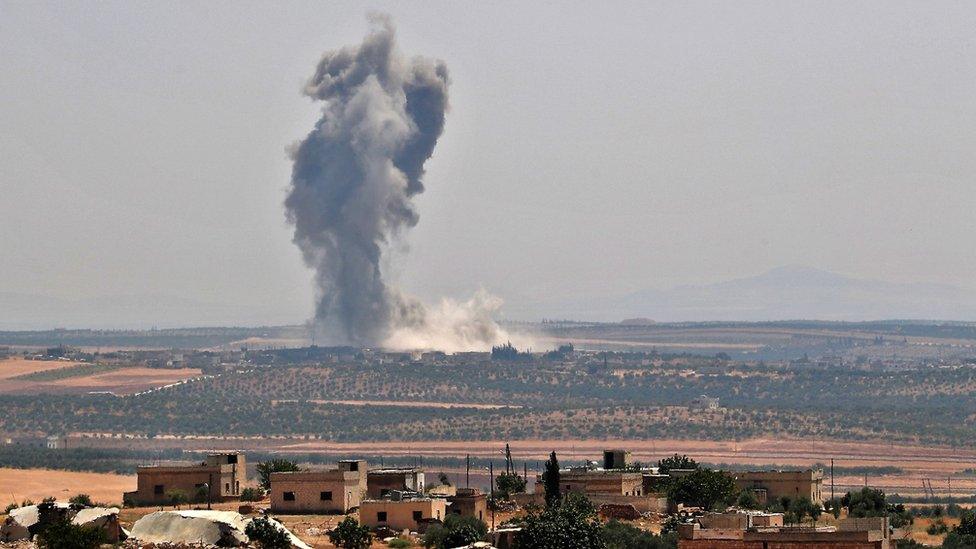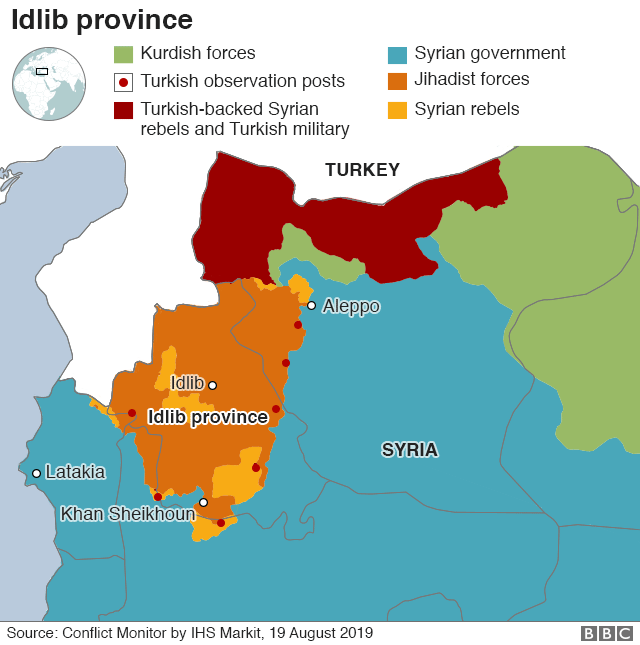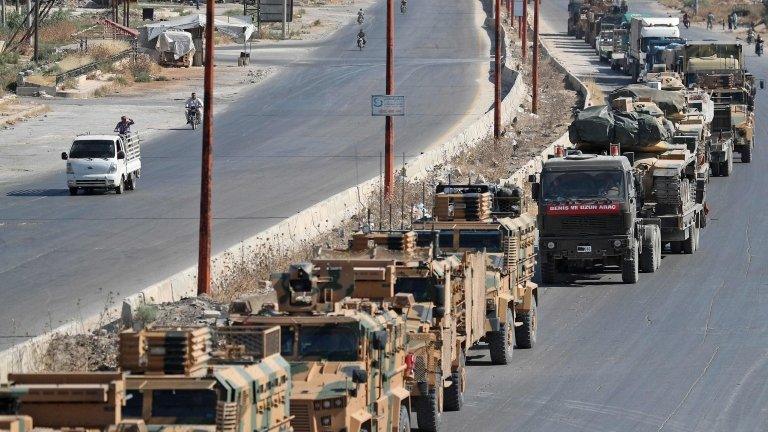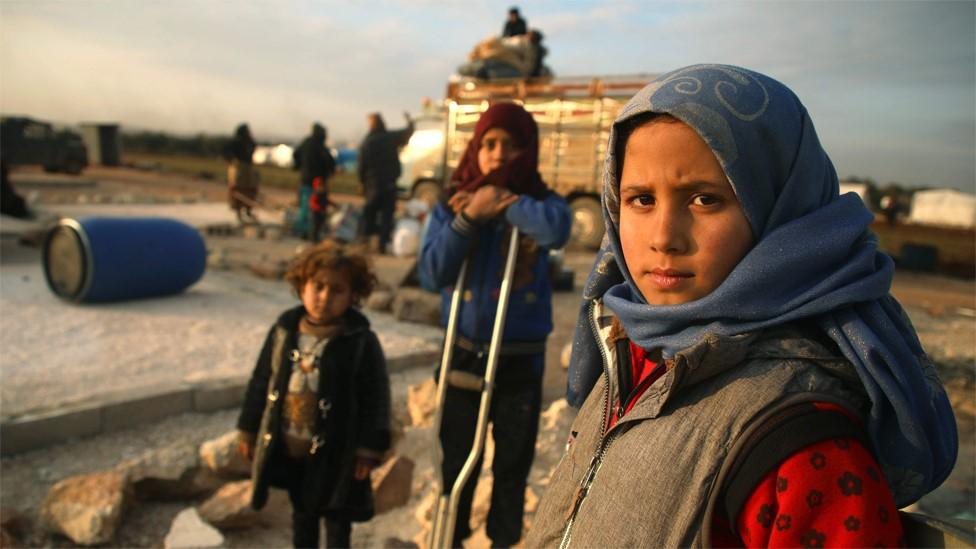Khan Sheikhoun: Syria rebels pull out of key town after five years
- Published

Smoke rises from Khan Sheikhoun in this photo taken Monday
Syrian opposition forces have withdrawn from the strategic town of Khan Sheikhoun, deep in the last rebel-held province.
Government forces, backed by Russia, closed in on the town in recent weeks, five years after rebels took over.
Rebels told the BBC that fighters pulled out of the town on Tuesday.
But an official statement from the main jihadist group in Idlib province, Hayat Tahrir al-Sham (HTS), characterised it as a "redeployment" of forces.
The fate of the town seemed to be in flux on Tuesday, as the UK-based monitoring group the Syrian Observatory for Human Rights reported it had fallen to government forces.
But then HTS issued a statement saying it had redeployed its fighters in the town after coming under a major bombardment.
Khan Sheikhoun has long been a flashpoint in Syria's civil war.
It was the site of a chemical weapons attack in 2017, which UN experts blamed on Syria. The incident prompted military strikes by the United States.
Syria chemical attacks: How one man lost his family in Khan Sheikhoun
The conflict in Syria has been going on for more than eight years.
Khan Sheikhoun is a strategically significant battleground in Idlib province. It lies along the Damascus-Aleppo road, which connects the two largest cities and runs through rebel-held territory.

An important rebel supply route
By Sebastian Usher, BBC Arab affairs analyst
In this case, the main gain for President Assad is that Khan Sheikhoun lies along the M5 road, which is the main economic artery through Syria from north to south, linking Damascus, Homs and Aleppo. Securing the motorway in its entirety is a major goal of the government offensive.
By the same token, taking Khan Sheikhoun could help cut off an important rebel supply route. Losing Khan Sheikhoun would also be a blow to the prestige of Hayat Tahrir al-Sham, an alliance of jihadist and rebel factions, which has all but taken over Idlib.
Its main component is al-Qaeda's former affiliate in Syria, the Nusra Front. The most effective fighting force on the rebel side, it remains designated a terrorist organisation by several countries, including the US - despite somewhat moderating its stance in recent years.
It's also faced opposition in Idlib itself by other rebel factions and civilian groups. But the estimated three million people in Idlib are unlikely to greet the fall of Khan Sheikhoun to with anything but trepidation.

The town has been the subject of a major offensive by the forces of President Bashar al-Assad in recent months. Hundreds of civilians have been killed, and hundreds of thousands more driven from their homes.
Idlib province - along with parts of northern Hama and western Aleppo - make up the last strongholds of the armed opposition.


Last year, a deal struck between Russia and Turkey - who back opposing sides in the civil war - was supposed to create a "buffer zone" to protect civilians and limit a major government offensive.
However, government forces have escalated their attacks in recent months, nearly encircling Khan Sheikhoun and the surrounding territory.
On Monday, a Turkish convoy was hit by a government air strike - with Syria alleging the vehicles were on their way to reinforce Khan Sheikhoun.
Turkey issued a stern warning to Syria on Tuesday, saying the government should not "play with fire".
"We will do whatever it takes to secure our troops," foreign minister Mevlut Cavusoglu told reporters.
His counterpart in Russia, Sergei Lavrov, said his country had military units "on the ground" in Idlib.
Russia joined the conflict in 2015 to support President Bashar al-Assad. Since then, the tide of war has turned firmly in his favour.
His government has reclaimed large amounts of territory and restored its control in much of the country - but is accused of war crimes by UN investigators and human rights groups."

The war in Syria: Five questions answered
How did the war start?
The country descended into war after President Bashar al-Assad's government used deadly force to crackdown on pro-democracy protesters, who took to the streets in March 2011 demanding political freedom.
Who is fighting who?
That's complicated: President Assad's regime is fighting rebel groups ranging from pro-democracy groups to jihadist extremists, while a number of foreign powers are providing support to various sides.
How many people have died?
It is not known exactly, as death tolls vary according to the source, but it is estimated to stand at more than 500,000 dead or missing.
How many refugees are there?
More than 5.6 million people have fled Syria since 2011, with another 6.6 million internally displaced, according to the United Nations.
What has happened to President Assad?
His position looked tenuous at one point during the eight year conflict, but thanks to international allies like Russia and Iran, President Assad has won back control of most of Syria, and has set his sights on Idlib.
- Published19 August 2019

- Published2 May 2023

- Published18 February 2020
